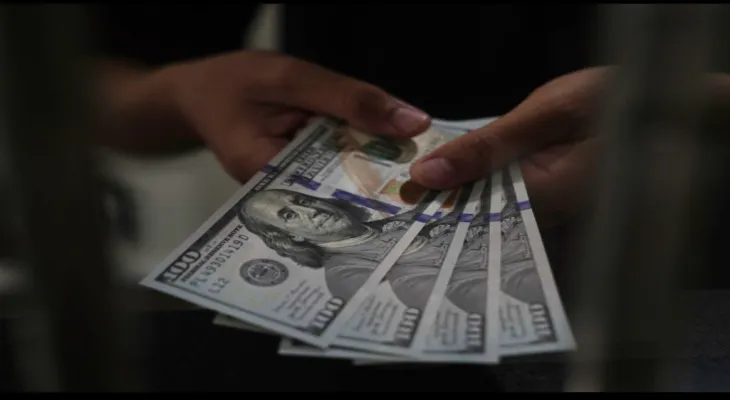Search here
Newspaper
Search here

Arab Canada News
News

Published: October 5, 2022
The US dollar is expected to continue gaining against other currencies, reinforcing speculation that governments may undertake extraordinary market interventions to boost the value of currencies on the losing side of the transaction.
About 45% of 795 participants in the recent Bloomberg "Market Live Pulse" (MLIV Pulse) survey expect the major global powers to attempt a coordinated effort to weaken the dollar, although the United States has moved to downplay talk of such a step.
A similar proportion of participants predicted that Japan would intensify its costly efforts to raise the yen's value on its own, without support from others. Meanwhile, two-thirds expect the Bloomberg Dollar Spot Index to rise to new record levels over the next month.
The dollar rose as international investors took advantage of high interest rates in the United States or sought refuge from market turmoil, including the United Kingdom, which is shaken by crises, and emerging markets.
How does the British financial community see the path to stability for the pound sterling?
The rising dollar exacerbates economic difficulties facing countries worldwide by increasing the import prices of food and fuel. This adds additional pressures on many central banks, which are raising interest rates in an attempt to limit the impact of the dollar's rise on consumer prices.
The uncontrollable rise in the dollar also adds burdens to US corporate profits by reducing the value of earnings made abroad when converted back to dollars. Nearly 90% of survey participants expect corporate profits in the third quarter to be more affected by the dollar's rise compared to the previous quarter.
Markets are awaiting Japan’s intervention to support the yen again after it surpassed 145 against the dollar
The rise of the greenback
Joseph Lewis, Head of Corporate Hedging and Foreign Exchange Solutions at Jefferies LLC, said: "The upward trend of the dollar will continue in the near term. In the long term, the world will see shifts and some other currencies will regain strength. But human behavior tells me the United States seems to be the best place to be right now."
The dollar rose due to the Federal Reserve’s tightest monetary policy since the early 1980s, leading to rising yields on US bonds.
The Federal Reserve’s mission to tame inflation is not over and will take time
The Bloomberg Dollar Index has risen 14% since the start of 2022 with the greenback gaining against the pound sterling and yen. The pound sterling collapsed to a record low level in late September due to concerns about large tax cut plans in the UK.
Japan spent $19.7 billion in its first market intervention since 1998 to support the currency, but the surprise move yielded no long-term results. Unlike the Federal Reserve, the Bank of Japan kept interest rates low.
Nancy Davis, founder of Quadratic Capital Management, said: "There is a significant difference between central banks' monetary policies, with the Federal Reserve being very tight, and others being quite lenient," such as the Bank of Japan and the People’s Bank of China. She added: "This situation makes the dollar incredibly strong."
Plaza Accord
The Biden administration has little incentive to weaken the dollar, as it could add more pressure on inflation in the United States. White House National Economic Council Director Brian Deese said he does not expect any agreement among major economies to address the strength of the US currency.
Gains for US bond traders depend on the end of the Federal Reserve’s interest rate path
But participants in the Market Live Pulse survey said that a sharp rise in the dollar’s value could lead to such a step.
The last major coordinated move to weaken the dollar was in the 1980s, when the UK, France, West Germany, Japan, and the United States agreed to work together in what was called the "Plaza Accord."
Japan was able in 2011 to gain support from the Group of Seven for intervention following the tsunami disaster and during the Asian financial crisis. The G7 members also coordinated to support the euro in September 2000.
Any potential coordinated market intervention could cause a significant rebound in most currencies against the dollar. In the two months following the Plaza Accord, the dollar declined by more than 10%, with the total drop peaking at about 50% over the next two years.
Currently, many investors have taken long-term investment positions by buying the dollar, and any intervention to weaken its value would lead to a heavy sell-off.
Earnings results
Adrian Zuercher, Head of Global Assets Investment at UBS Global Wealth Management, said in an interview with Bloomberg TV that the pound sterling and euro are already in a "quasi" crisis, and ultimately "we may even need some coordination from central banks if this continues."
The strong dollar also harms some equity investors. Nearly 90% of survey participants said its impact would be more clearly seen in third-quarter earnings results.
Microsoft warned that the rising dollar hurts its net profits after tax when it cut its forecasts in June, just before the Q2 earnings season.
During conference calls announcing quarterly earnings for companies listed in the S&P 500 index, analysts and company executives mentioned the word dollar more than 1,000 times, the highest number in three years, according to Bloomberg data.
Lewis of Jefferies said: "Hedging rates and foreign exchange markets are front and center for people. For most companies, a 5% or 10% currency move is something they can ignore, but a 20% move is something they have to somewhat deal with."
"Morgan Stanley": The likely Federal Reserve path won’t end profit problems
Some Market Live Pulse survey participants also cited the emerging markets debt crisis, liquidity problems, and refinancing as potential threats resulting from the dollar’s rise this year. They also addressed the energy crisis, as the stronger dollar makes oil and gas more expensive in local currencies, leading to already high inflation rising further.
Comments